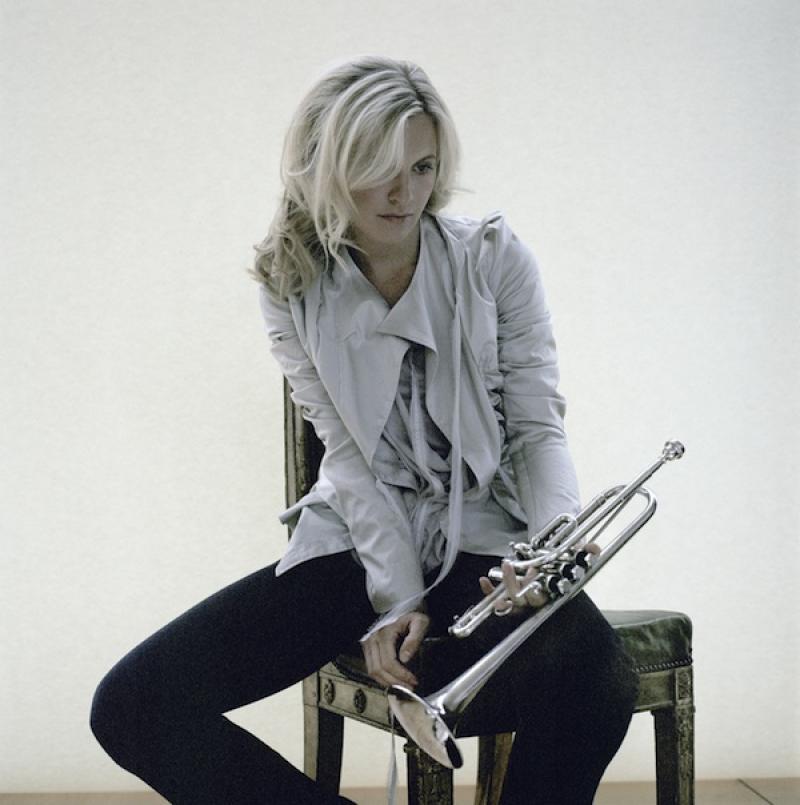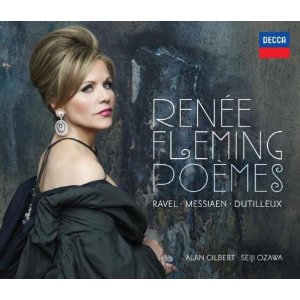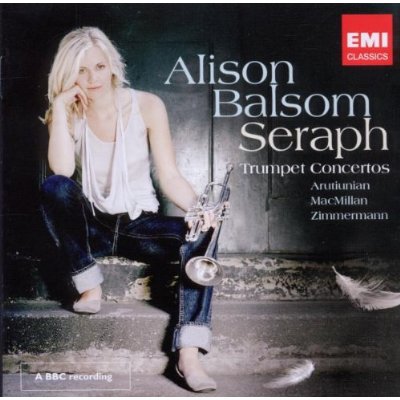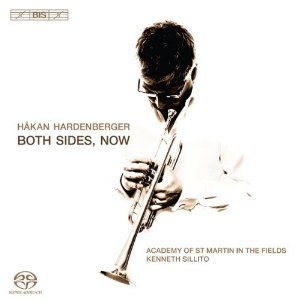Classical CDs Weekly: Alison Balsom, Renée Fleming, Håkan Hardenberger | reviews, news & interviews
Classical CDs Weekly: Alison Balsom, Renée Fleming, Håkan Hardenberger
Classical CDs Weekly: Alison Balsom, Renée Fleming, Håkan Hardenberger
Two trumpet anthologies and a disc of French song


The veteran French composer Henri Dutilleux is known for his select, refined output; this is a musician who only speaks when he’s sure he has something worth saying, usually expressed in music of intense elegance and poise. American soprano Renée Fleming, known to the composer, was chosen to give the first performances of his recent song cycle Le temps l’horloge in 2009, and it’s a live recording from 2009 that we get here. Four contrasting poems are set alongside a brief orchestral interlude, and the results are compelling. Fleming’s immaculate French diction is an asset, and Dutilleux’s luminous orchestral colours gleam under Seiji Ozawa’s direction. No effect is overplayed; the little touches of accordion in Desnos’s Le dernier poème, or the suitably queasy rhythms heard at the outset of the final song, Enivrez-vous (or Get Drunk). Fleming also sings Dutilleux’s earlier Deux sonnets de Jean Cassou, dating from 1954.
Messiaen’s Poèmes pour mi were written in 1936, an intoxicating sequence of songs celebrating the composer’s love for his first wife. Fleming’s ecstatic swoops and swoons are wondrous. This is music which invokes awe as well as delight; Messiaen’s habit of capping the most offbeat chord sequence with a glowing major triad never irritates, and the chiming bells (“La joie est revenue”) at the brash close of the cycle are magical. Ravel’s Shéhèrazade is far better known; a textbook example of imaginative word-setting. Tristan Klingsor’s fruity poetry is matched by Ravel’s characteristic orchestral finesse. Sample the third song, L’indifférent, where Fleming’s ability to sing really softly comes into its own. Here, Alain Gilbert conducts the Orchestre Philharmonique de Radio France. Good to see that a major label is still willing to promote high-quality, offbeat repertoire – snap this disc up before it gets deleted.
Renée Fleming sings Poèmes pour mi

Like Sarah Willis, Alison Balsom is another instrumentalist forging a highly successful career in a male-dominated field. Her EMI releases up to now have included arrangements and transcriptions; here’s a smart compilation of trumpet concertos composed from 1950 to the present. The earliest work is Alexander Arutiunian’s kitschy, compact concerto – at once terribly naff and thrillingly enjoyable, its portentous sub-Shostakovich opening yielding to a principal theme of inescapable silliness. Lovely stuff though, especially the sections where Arutiunian invokes the music of his native Armenia in glowing primary shades. Balsom’s glorious sound makes you forgive any musical shortcomings, though a touch of vibrato-laden vulgarity would be welcome. You welcome Balsom’s bold decision to include the concerto Nobody Knows de Trouble I See by German composer Bernd Alois Zimmermann, composed in the mid-1950s. Zimmermann’s use of an American spiritual, and its gradual assimilation into a predominantly serial work, was intended as an anti-racist statement in the postwar years. Less pretentious and more musically satisfying than one has any right to expect, this is possibly a masterpiece. Zimmermann’s angular melodies are haunting, expressive, and the emotional trajectory is compelling.
Takemitsu’s brief Paths, a six-minute solo written in memory of Lutoslawski, is less memorable. More successful is James MacMillan’s witty Seraph, which nicely exploits the trumpet’s comedic potential alongside Balsom’s ability to spin a cantabile line. It’s surely destined to become a repertoire work. I’m biased, but there’s something calmly uplifting about good brass playing. And this disc, well, uplifts.

A virtuoso from an earlier generation, Swedish trumpeter Håkan Hardenberger is easy to pigeonhole as an avant-garde specialist, one of those rare performers who can unpick the thorniest, most gnomic utterance by the likes of Henze and Birtwhistle. Here he is in the most unlikely of releases, a selection of songs and film themes backed by deftly arranged strings. A disc which recalls a famous 1950s Chet Baker album. Hardenberger expresses his motivation succinctly in the sleeve note: “I always look for the melody, no matter how avant-garde or complex the score… after all, isn’t that a basic human instinct?”
Hardenberger plays things pretty straight; there’s no ostentatious showing off and the arrangements, by several hands, are affectionate and subtle. The range of composers is eclectic; you don’t expect to find Joni Mitchell and Astor Piazzolla sharing a disc. But they do: Mitchell’s Both Sides, Now coexists with a smoky rendition of a slow Piazzolla tango. Highlights include Jan Lundgren’s The Seagull, solo trumpet ruminating over Lynda Houghton’s pizzicato bass, and a dark reading of Weill’s beautiful Speak Low. The mood is nocturnal, elegiac. The most tasteful crossover disc I’ve heard in ages, and BIS’s monochrome presentation suits the project perfectly. Good sound as well.
Buy
Explore topics
Share this article
The future of Arts Journalism
You can stop theartsdesk.com closing!
We urgently need financing to survive. Our fundraising drive has thus far raised £49,000 but we need to reach £100,000 or we will be forced to close. Please contribute here: https://gofund.me/c3f6033d
And if you can forward this information to anyone who might assist, we’d be grateful.

Subscribe to theartsdesk.com
Thank you for continuing to read our work on theartsdesk.com. For unlimited access to every article in its entirety, including our archive of more than 15,000 pieces, we're asking for £5 per month or £40 per year. We feel it's a very good deal, and hope you do too.
To take a subscription now simply click here.
And if you're looking for that extra gift for a friend or family member, why not treat them to a theartsdesk.com gift subscription?
more Classical music
 Robin Holloway: Music's Odyssey review - lessons in composition
Broad and idiosyncratic survey of classical music is insightful but slightly indigestible
Robin Holloway: Music's Odyssey review - lessons in composition
Broad and idiosyncratic survey of classical music is insightful but slightly indigestible
 Classical CDs: Wolf-pelts, clowns and social realism
British ballet scores, 19th century cello works and contemporary piano etudes
Classical CDs: Wolf-pelts, clowns and social realism
British ballet scores, 19th century cello works and contemporary piano etudes
 Bizet in 150th anniversary year: rich and rare French offerings from Palazzetto Bru Zane
Specialists in French romantic music unveil a treasure trove both live and on disc
Bizet in 150th anniversary year: rich and rare French offerings from Palazzetto Bru Zane
Specialists in French romantic music unveil a treasure trove both live and on disc
 Scottish Chamber Orchestra, Ibragimova, Queen’s Hall, Edinburgh review - rarities, novelties and drumrolls
A pity the SCO didn't pick a better showcase for a shining guest artist
Scottish Chamber Orchestra, Ibragimova, Queen’s Hall, Edinburgh review - rarities, novelties and drumrolls
A pity the SCO didn't pick a better showcase for a shining guest artist
 Kilsby, Parkes, Sinfonia of London, Wilson, Barbican review - string things zing and sing in expert hands
British masterpieces for strings plus other-worldly tenor and horn - and a muscular rarity
Kilsby, Parkes, Sinfonia of London, Wilson, Barbican review - string things zing and sing in expert hands
British masterpieces for strings plus other-worldly tenor and horn - and a muscular rarity
 From Historical to Hip-Hop, Classically Black Music Festival, Kings Place review - a cluster of impressive stars for the future
From quasi-Mozartian elegance to the gritty humour of a kitchen inspection
From Historical to Hip-Hop, Classically Black Music Festival, Kings Place review - a cluster of impressive stars for the future
From quasi-Mozartian elegance to the gritty humour of a kitchen inspection
 Shibe, LSO, Adès, Barbican review - gaudy and glorious new music alongside serene Sibelius
Adès’s passion makes persuasive case for the music he loves, both new and old
Shibe, LSO, Adès, Barbican review - gaudy and glorious new music alongside serene Sibelius
Adès’s passion makes persuasive case for the music he loves, both new and old
 Anja Mittermüller, Richard Fu, Wigmore Hall review - a glorious hall debut
The Austrian mezzo shines - at the age of 22
Anja Mittermüller, Richard Fu, Wigmore Hall review - a glorious hall debut
The Austrian mezzo shines - at the age of 22
 First Person: clarinettist Oliver Pashley on the new horizons of The Hermes Experiment's latest album
Compositions by members of this unusual quartet feature for the first time
First Person: clarinettist Oliver Pashley on the new horizons of The Hermes Experiment's latest album
Compositions by members of this unusual quartet feature for the first time
 Gesualdo Passione, Les Arts Florissants, Amala Dior Company, Barbican review - inspired collaboration excavates the music's humanity
At times it was like watching an anarchic religious procession
Gesualdo Passione, Les Arts Florissants, Amala Dior Company, Barbican review - inspired collaboration excavates the music's humanity
At times it was like watching an anarchic religious procession
 Classical CDs: Camels, concrete and cabaret
An influential American composer's 90th birthday box, plus British piano concertos and a father-and-son duo
Classical CDs: Camels, concrete and cabaret
An influential American composer's 90th birthday box, plus British piano concertos and a father-and-son duo
 Cockerham, Manchester Camerata, Sheen, Martin Harris Centre, Manchester review - re-enacting the dawn of modernism
Two UK premieres added to three miniatures from a seminal event of January 1914
Cockerham, Manchester Camerata, Sheen, Martin Harris Centre, Manchester review - re-enacting the dawn of modernism
Two UK premieres added to three miniatures from a seminal event of January 1914

Add comment